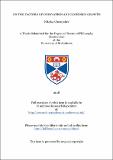On the factors of innovation and economic growth
Abstract
One could hardly overstate the importance of economic growth and innovation
as the engine of continuous improvement in the quality of life and wellbeing.
This dissertation seeks to improve our understanding of factors impacting
on economic growth and the process of innovating.
Chapter 1 underscores that exploring the relationship between competition
and innovation requires consistency in the way innovation is measured and
proxied. It shows that a failure to do so can lead to conflicting conclusions on
how competition affects innovation.
Chapter 2 explores the literature on the relationship between business
cycles and innovation to argue that existing evidence is conflicting and implies
that research and development (R&D) activities respond positively to downturns
at the level of individual firms (i.e. are countercyclical) but negatively at that of
sectors and economies (i.e. are procyclical). The chapter explains this regularity
through the procyclicality of fluctuations in the number of R&D performers,
which offsets the countercyclicality of individual R&D profiles and makes it look
procyclical at the aggregate level.
Chapter 3 documents and analyses the positive link between the strength
of intersectoral connections within an economy, and its growth. To explain this
regularity, it develops a tractable theoretical framework whereby tighter connections
bring about stronger propagation downstream of productivity growth
episodes in individual firms and sectors. Analysing the framework yields stark
testable predictions on the most growth-enhancing structure of the intersectoral
linkage.
Type
Thesis, PhD Doctor of Philosophy
Collections
Items in the St Andrews Research Repository are protected by copyright, with all rights reserved, unless otherwise indicated.

